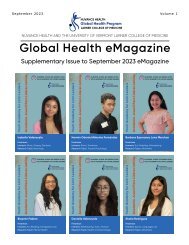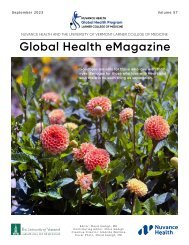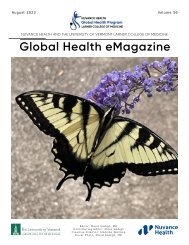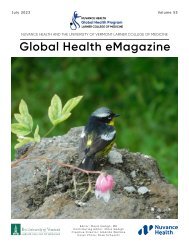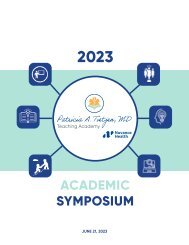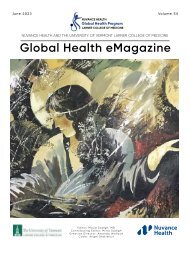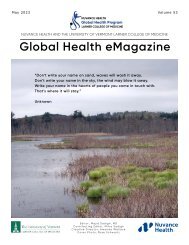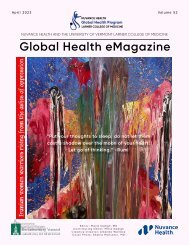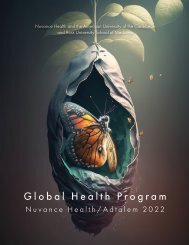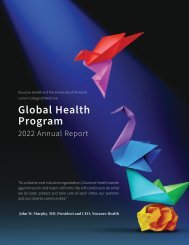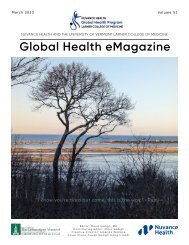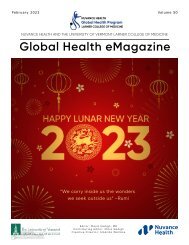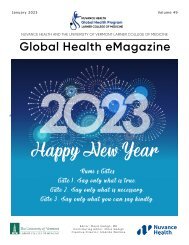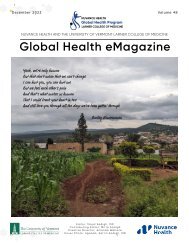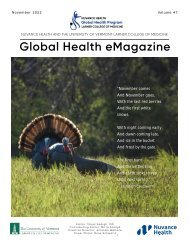Create successful ePaper yourself
Turn your PDF publications into a flip-book with our unique Google optimized e-Paper software.
OUR PEOPLE,<br />
OUR MISSION<br />
Global Health<br />
<strong>eMagazine</strong><br />
<strong>March</strong> 2022<br />
Stay Human<br />
Written by Mahsheed Khajavi, MD<br />
This pandemic, with its deep human consequences along with<br />
its divisive social and economic upheaval has drawn attention<br />
to the vulnerability of our critical healthcare system.<br />
Heightened stress levels have frayed emotions and the general<br />
collective fear has resulted in angry social media disputes,<br />
flaming emails, and raised voices in all venues of expression.<br />
During these times, it is often easier to accept some version of “thickening one’s skin” and becoming<br />
more mechanical and emotionally distant.<br />
I have heard this from colleagues and watched as many become so distant that they no longer<br />
derive any pleasure or meaning from the mission of medicine.<br />
Midway through 2021, I found myself in this same group. Waking up and thinking about getting<br />
through rather than getting into my day was the best I could achieve. I would fall out of my bed,<br />
go through the ritual of daily preparation, drive with my NPR station discussing SARS-CoV-2, and<br />
tune out.<br />
A Note from Dr. Sadigh<br />
Reflections on 2021<br />
Highlights<br />
Nursing Division<br />
SARS COV-2 Pandemic<br />
and Us<br />
Unification<br />
Condolences: Paul Farmer<br />
Art to Remind Us of<br />
Who We Can Be<br />
Articles of the Month<br />
Videos of the Month<br />
Announcements<br />
Calendar<br />
Resources<br />
I would walk into the hospital with a census of 45 patients, the majority of whom had respiratory<br />
failure from COVID-19 multifocal pneumonia. Returning home after 16 or 18 hours, I would skim JAMA<br />
and NEJM for any new reports or changes in guideline-directed therapy.<br />
Becoming less and less present with those around me, the idea of putting my backpack on and<br />
going for a walkabout was the most satisfying desire.<br />
I thought back to my years of medical school and training. The advice, sometimes implicit and<br />
sometimes overt, was that as a physician I had to develop emotional distance. Otherwise, I would<br />
be utterly overwhelmed and unable to complete my duties.<br />
I remember an attending telling me “you will lose your intellectual acumen if you take these patients<br />
home with you.” This was in Atlanta during the early AIDS epidemic. This was the time when Grady<br />
Hospital placed eight patients in each room on the AIDS floor, the vast majority of whom were<br />
emaciated and unable to stand without assistance.<br />
I remember quietly condemning this philosophy. Although I could not articulate my understanding<br />
then, I believe that on some level there was an innate and intuitive knowledge that without empathy,<br />
both patients and caretakers would be compromised.<br />
Twenty-seven years later I found myself becoming the person I had so easily condemned. I told<br />
myself to “toughen up” if I did not want to end up on the shower floor sobbing each night. I convinced<br />
myself that creating an emotional barrier would help me continue to work in a clinical atmosphere<br />
that, up until this point, I had never experienced.<br />
I could not have been more misguided. I can’t say when or how I lost myself and truthfully, I can’t<br />
really say when I came back.<br />
I think part of my return came after reading an article on physician burnout. The article noted that<br />
about half of all physicians reported burnout last year, highest among those who worked in the<br />
hospital and intensive care units.<br />
The article discussed the fact that burnout caused emotional distancing and that the cudgel of<br />
“emotional weakness” was a long and ingrained tenant of medicine.<br />
And somehow, I realized that demanding “toughness” only resulted in my inability to experience the<br />
full range of emotions necessary to connect with my patients.<br />
I had this backwards. It was not burnout which caused my lack of empathy. It was my deliberate<br />
decision to distance myself (in order, in some bizarre way of thinking, to keep myself intact) which<br />
had caused my burnout.<br />
5<br />
Reflections continued on next page >>




